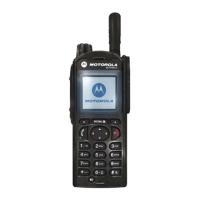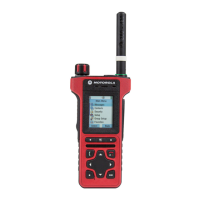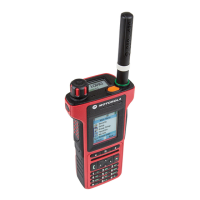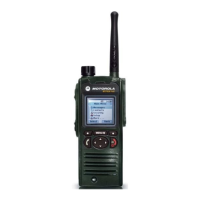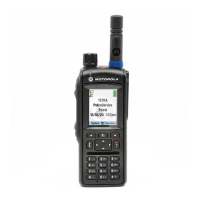2-12 Services and Feature Description
6866588D21-D Chapter 2 - MTP850 Ex/MTP810 Ex Product Information Manual March 2009
If the user is not the transmitting party, Unannounced cell reselection will be employed, followed by
call restoration procedures.
2.2.7 Temporary Group Address
The terminal supports a temporary group address assigned by the SwMI which is only valid for the
lifetime of the call. Thus, if the terminal initiates a group call on the selected group, and the SwMI
assigns the call to a temporary group, the terminal will monitor all signalling addressed to this
temporary group as long as the call is active.
The terminal supports assignment of an incoming group call to a temporary group address.
2.2.8 Late Entry
The terminal assumes that the SwMI sends repeated setup messages (’late entry’) on the main
control channel. Thus, in certain circumstances (such as when receiving a priority monitor call if
provisioned as ‘Presented’ - See Paragraph 2.1.14 "Priority Monitor") it will ignore a group call on
the assumption that it can join the call at a later time.
The terminal will join a group call setup which contains an SS-LE notification element indicating Late
Entry Broadcast. However, it will not differentiate between this and a regular call setup in any way.
Note: Acknowledged Late Entry, and Late Entry Paging is not supported.
2.2.9 User initiated Group Attachment
When the user changes the selected talkgroup, the terminal will initiate an attachment to the SwMI,
detaching the old group and attaching the new Talkgroup.
All group attachments sent by the terminal are sent with ‘attachment mode’ of ’amendment’ or
’detach all...’ on a case-to-case basis depending on which form will cause less bits to be sent over
the air interface.
When the user selects a scan list and turns scanning on, the terminal will send a group attachment
request to attach the scan groups in addition to the selected group. Similarly, when the user selects
an ATG, the terminal will send an attachment of the ATG as the selected group along with the
attachment of the associated groups as scan groups. If a group associated with an ATG is selected,
the terminal will send an attachment of the associated group as the selected group along with the
attachment of the ATG as a scan group in addition to other scan groups it is scanning.
The TETRA TIP provides a facility by which the terminal can send a status message to the SwMI to
turn scanning off and on rather than detaching and re-attaching the groups in order to save air
interface signalling.
If the terminal is provisioned with this option, when the user turns scanning off the terminal sends an
appropriate TETRA signalling (Status Uplink set to 0x20, and Scanning On/Off set to OFF (1)). In
this state the terminal does not monitor any groups other than the selected group (this includes user
scan groups, super groups of scan groups, SwMI scan groups, ATG when an associated group is
selected and associated groups when an ATG is selected). If the user subsequently turns scanning
on, the terminal will send an appropriate TETRA signalling (Status Uplink set to 0x20, and Scanning
On/ Off set to ON (0)). and the terminal will begin again monitoring all attached groups.
If the terminal is not provisioned with this option, the user will only have an option to deselect the
active user scan list, but will not be able to turn (all) scanning off. Deselection of the user scan list
will cause a group detachment of the user scan list groups to be sent to the SwMI; but the terminal
will continue to scan all other groups (such as ATG associations).
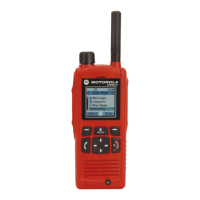
